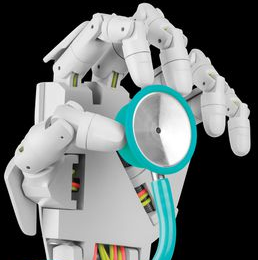 The Atlantic article The Robot Will See You Now is a good read. There's a lot of discussion about how the AI technology developed for IBM Watson could benefit the health care system. Also, advanced computing combined with the use of smart phones for physiological data collection and transmission has real potential:
The Atlantic article The Robot Will See You Now is a good read. There's a lot of discussion about how the AI technology developed for IBM Watson could benefit the health care system. Also, advanced computing combined with the use of smart phones for physiological data collection and transmission has real potential:
As sensors shrink and improve, they will increasingly allow health to be tracked constantly and discreetly—helping people to get over illnesses faster and more reliably—and in the best of cases, to avoid getting sick in the first place.
The preventative component of continuous monitoring could have a significant impact in the effectiveness of healthcare delivery.
The economics and psychology of "Health 2.0" will be an evolutionary process. The movement towards less skilled healthcare professionals equipped with "clinical support" tools is inevitable. Hopefully that will be as close as we get to having to visit a robot doctor.
